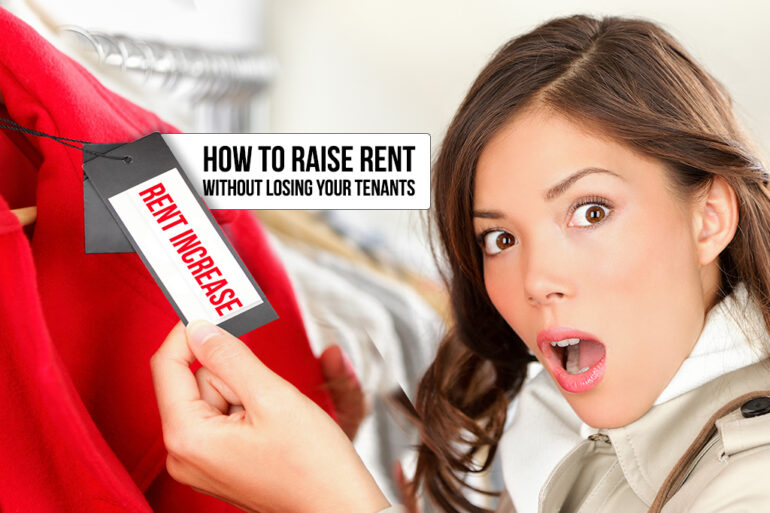How to Raise Rents Without Losing Your Tenants
Now that property and rental values are skyrocketing with the peak of the pandemic behind us, it is time to raise rent if you haven’t already. The past year threw a lot of things out of whack, including the rental market.
As real estate prices soar, the average national rental price is significantly higher than pre-pandemic levels.
In fact, according to this recent report by Apartment List, it is nearly $200 higher than it was pre–COVID-19. Prices are going up, no doubt. But how do you raise your rent without losing your tenants?
Losing tenants is one of the costliest parts of being a landlord. If you have kept on top of repairs, it could cost you anywhere from $500-$3,000. If you haven’t, it could be a whole lot more. Between painting, flooring, searching for a new tenant, and vacancy, your past profits will quickly disappear.
How do you avoid turnover without keeping the same monthly rent from when your tenant signed on years ago? I have a few tricks you need to add to your landlord toolbox.
Landlord Toolbox
There are several proven tactics used by seasoned investors that make a world of difference. With our current rental market, now is the time to consider raising rent. If you do not raise your rent, you lose net income every year as property values around you continue to increase. So, what are these magical methods?
Write Rental Increases into the Lease
Rents go up just as property values everywhere go up over time. It is a fact of life. Inflation happens, we must pay our taxes, and every year our cost of living increases in many aspects, including our rent.
Set the expectation from the beginning so your tenant doesn’t feel like you dropped a bombshell on them.
Know the Tenant-Landlord Laws
Landlord laws vary state to state. It is important to know what’s required of you by your tenant and what procedures to follow when you decide to raise rent. Most states require a written notice 30-120 days in advance for long-term leases. If you are leasing month to month, the requirements may be different.
When you mail your notice, it’s a good idea to keep a receipt for your records. Certified mail is a great way to ensure that.
There are limits to how much you can legally raise rent within certain areas and with specific tenants. You can easily check online for rent regulations in your region. If you happen to have Section 8 tenants, they have their own set of guidelines.
Don’t Raise Rent Exponentially
On average, before COVID-19, rent increased at a rate of 2% per year. If your tenant is paying $1,200 a month, a $24 per month increase most likely won’t be worth moving. By raising rent between 2-4% every year, you can stay on top of local property values rising and inflation increases.
If you forgot to raise rent and are now backtracking, it can be trickier. You need to be able to get a return on your investment that includes things you’ve had to fix as well as administrative fees, taxes, and so on.
If you suddenly raise your tenant’s rent by hundreds of dollars a month, you’ve basically forced them to move. Not many people can handle an unexpected increase in expenses, and they might just move out of anger even if they could afford it.
The danger zone begins around 8%. If you raise rent by that much or higher without precedent, you’re playing with fire. That manageable $24 from before just turned into $96. If this wasn’t written into the lease, it will be a lot harder to sell and you could face a turnover.
Save yourself and your tenants the headache by making smaller, more consistent increases over time. Try 4% for two years in a row or 5% now and 4% next year. Expenses come up and you need to cover them, but don’t pour gasoline on the fire by forcing yourself to find a new tenant as well.
Make Upgrades to the Rentals
You may be thinking that upgrades are out of the question. With a small profit margin, how could you buy a new appliance or fix the leaky sink? This may seem like it will cost you more, but not necessarily. Things need to be replaced and fixed over time. By listening to your tenant and fixing some things (but not all), they will feel heard and be more likely to renew.
You could try asking them a couple times a year what kind of improvements they’d like to see. When it comes time to renew the lease, let them know about the increase in rent and also that you’re replacing the ancient dishwasher they have hated since they moved in.
If your tenant calls you about something that needs to be fixed, take care of it within a reasonable amount of time. Nobody wants to renew with someone who took a month to fix their shower and made it necessary to bathe in the sink.
Be a Person with your Tenants
Your tenants are human beings just like you. Like most people, they probably enjoy talking about themselves and are happy when someone cares enough to ask. Keep a brief record somewhere with notes on all your tenants. Pull it out whenever you give them a call.
For the first minute of the call, ask them about their life. Did Julie win her school spelling bee? How is the new job going?
This makes you a person rather than a billing department. You don’t need to become best friends with your tenants, and I recommend keeping it professional. But it doesn’t take much effort to be personable.
When it is time to raise rent/renew the lease, give them a call. Nobody likes opening a letter to find out next month their cost of living is going up. Hearing about it from a person can soften the blow. Give them a quick call the day you send out the notice to give them time to prepare.
After that minute of small talk, try this: “I just want to let you know that your lease is set to renew on April 30, and rent is going up by $80 this year.”
If you’ve already written into their lease that rent will go up, there’s no surprise. If not, you might get some pushback. Let them know that your expenses are going up too just as taxes and housing values are.
Offer Alternatives
You may want to raise rent by $120 a month this year, but if that results in your tenant leaving, your new profits could quickly vanish. If you like your tenant and want to avoid turnover, try offering an alternative.
“Rent is going up by $120 per month this year. But if you renew for two years, it’s only $80 more per month.” People like discounts and it incentivizes them to stay longer, saving you costly turnover.
Set the Expectation with your Tenants
By creating the expectation that rent goes up yearly, you give your tenant time to plan accordingly. You also give yourself the profits you need to make your investments worthwhile.
Avoiding raising rents hurts everyone — your tenant and you. Prices go up, taxes go up, and so does rent. Now go get that rent money!








